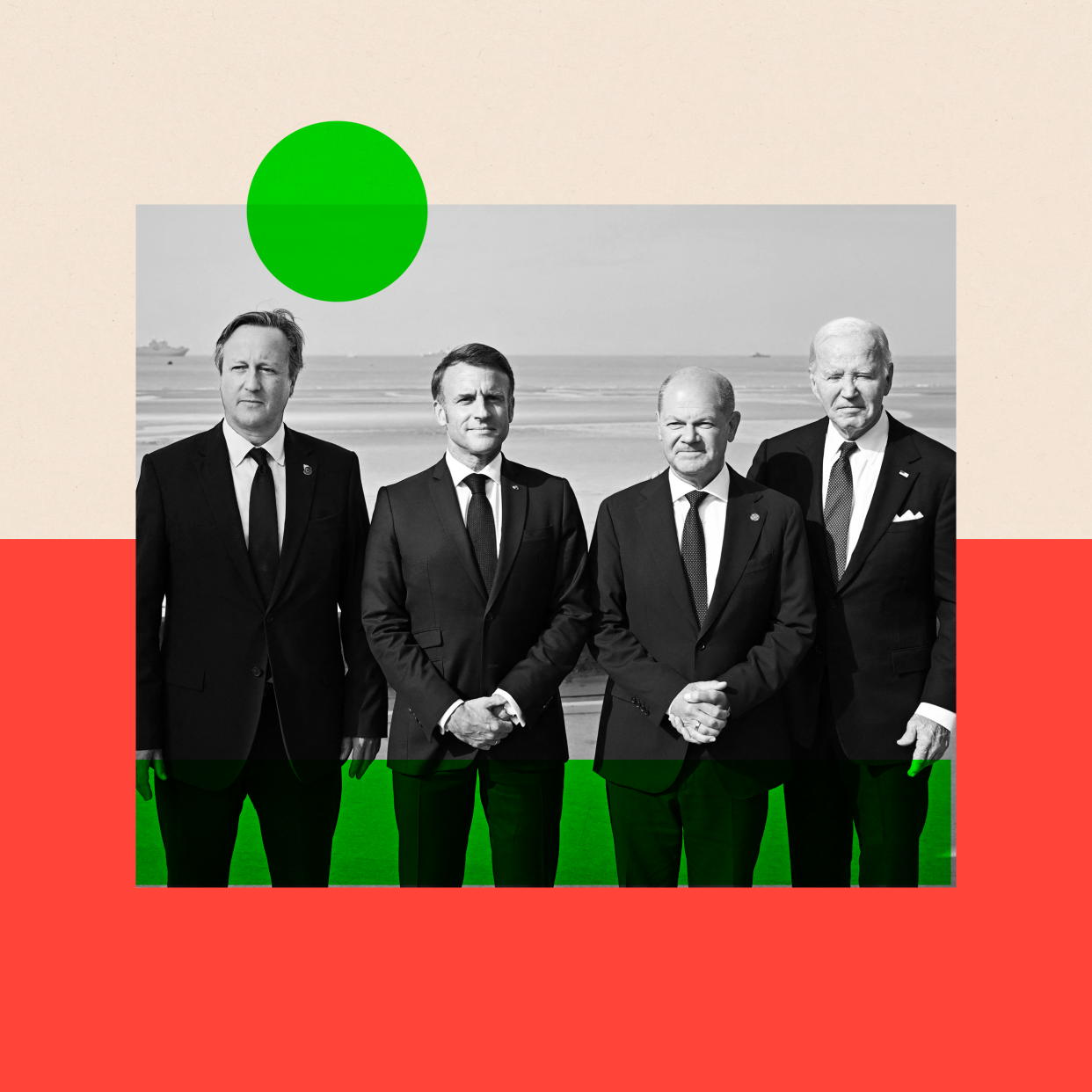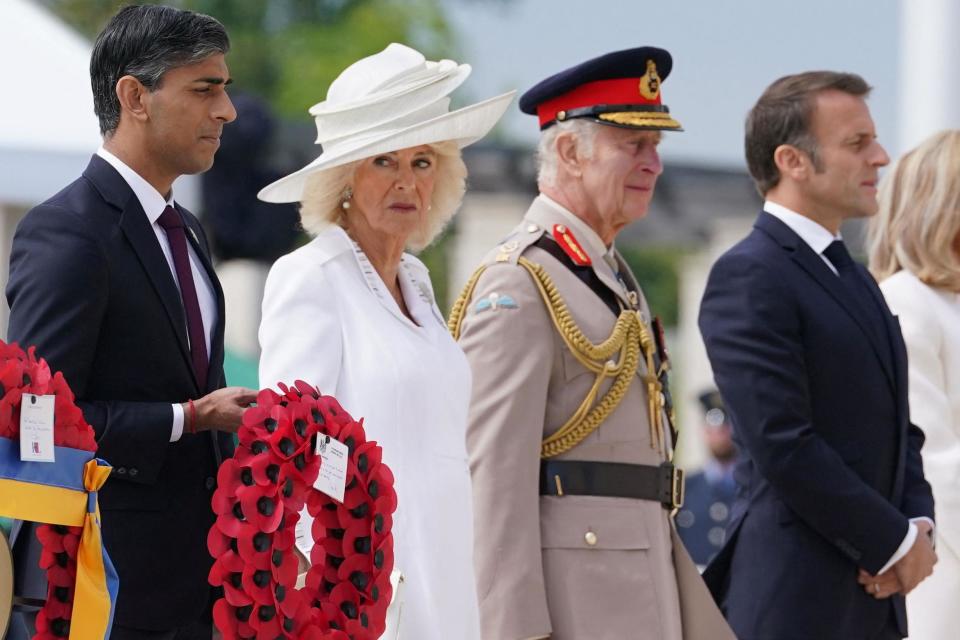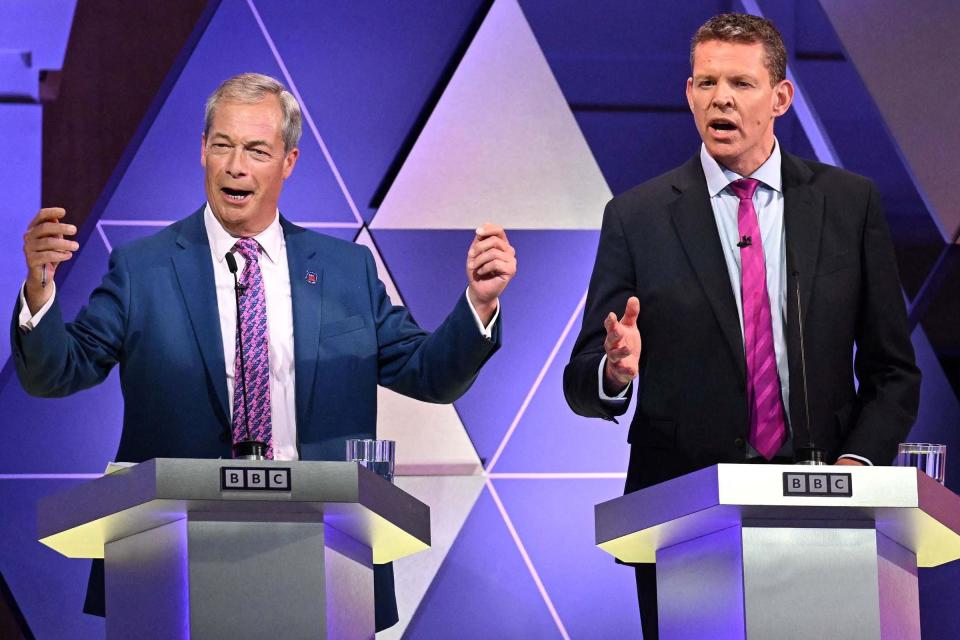Sunak's shocking week makes Tory election fight even tougher

“Very wrong.” “Crushing.” “He knows he has made a mistake and it’s a factor in the election campaign we didn’t want to have.”
In public, that’s how Rishi Sunak’s cabinet colleagues have described his D-day blunder.
In private, it’s even worse.
One member of the cabinet told me it shows that Sunak “just has no idea how to do politics”.
A senior party figure told me: “It feels like Michael Foot in a donkey jacket at the Cenotaph,” referring to the former Labour leader’s infamous attire in 1981. “It just makes your heart sink.”
Another Tory source told of their disbelief at Sunak’s decision to leave the D-Day ceremonies early, claiming that “this is the worst political operation in modern Number 10 history”.
There’s a different view from some of the PM’s allies, a committed group of people working as hard as they can in very tough circumstances. They have four - what might feel very long - weeks to go.
A loyal minister says there are only two options now: “Lose your head or get on with the campaign.”

The mistake itself
In the frenzy of campaigns, just like in politics and life in general, everyone makes mistakes sometimes.
This one is almost impossible to fathom.
It wasn’t a split-second decision that went the wrong way, or a hot-mic moment like Gordon Brown’s grisly "bigoted woman" comment about Gillian Duffy back in 2010. It was a deliberate choice made in advance.
Sunak’s decision to miss some of the ceremony was always likely to cause diplomatic offence and upset veterans. And from a campaigning point of view, he was turning down some of the most powerful images any candidate could dream of, to be seen alongside the American President, the Royal Family and military figures.
His early departure meant he wasn't part of a photograph of world leaders. Instead Foreign Secretary David Cameron was pictured standing alongside President Biden, France's President Emmanuel Macron and German Chancellor Olaf Scholz.
It should have been a golden opportunity for the prime minister to project strength, particularly when the Conservatives are trying to portray Labour as weak on defence. “It was a no brainer,” one minister says. “Why not pick up the $100m bill on the floor?”
A quick apology is just about the only aspect of affair that was not a disaster.
Sunak's D-Day absence: How the PM walked into an election blunder
D-Day absence an extraordinary own goal from the Conservatives
Ammo for smaller parties
The danger for the Conservatives now is not just that the D-day blunder colours the election conversation, but that fear and loathing inside the campaign bursts into the open.
In the seven-party BBC debate last night, the saga gave the smaller parties a political gift - Nigel Farage blasted the PM for being “unpatriotic”.
Sunak is, I’m told “genuinely remorseful” about what happened and has acted in government to try to help veterans, so this stings.
But even before this, there were fears that Reform UK, under Farage’s leadership, could nudge past the Conservatives in polling, possibly in the next few days.
“If Reform overtake [it] will lead to total panic,” a party source told me. No doubt Sunak’s early exit is particularly tricky because it’s likely to upset precisely those voters the Conservatives have been trying to entice back.
All of the smaller parties, for whom it can be hard to get a word in edgeways, were able to hammer the Tories last night with what seemed genuine indignation.
It was also noticeable that they are all assuming a Labour victory – indeed, they are trying to turn that projection to their campaigning advantage.
The Greens, Plaid and the SNP all, in various ways, tried to portray themselves as the ones who can keep Labour honest, to hold the party to its left-wing roots and stop it becoming what they claim would be a softer pastiche of the Tories.

One source told me: “It’s clear the smaller parties are the only challenge to Labour, and that’s part of their way into the debate. It’s clear the Tories aren’t winning so who holds Labour to account?”
Indeed one senior Conservative source believes the share of the vote for the smaller parties is likely to be the highest it’s ever been this time round. Let’s see.
My regular reminder: voters are volatile, and there is a long time left in this campaign.
But as we talked about last week, if Labour wins, it might have to get used to much of the pressure coming from the broad left.
Plaid and the SNP also both made positive arguments for immigration - a rare moment in politics in 2024. An SNP insider said their party “actually has something to say, breaking the conspiracy of silence on cuts, on Brexit and on migration too”.
The Lib Dems - who are having the bounciest of campaigns – admit that for smaller parties, “the existential challenge is not that people don’t like your policies: it’s that people literally forget you exist”.
Smaller parties sometimes have to be the fastest, the funniest, or the most controversial to cut through.
There is no doubt in this general election, though, that smaller parties could hold a lot of sway. See how often Keir Starmer’s been campaigning in Scotland to try to humble the SNP.
Or just ask Conservative MPs desperately worried about the Lib Dems and Reform.
Questions for the campaign
The big moves and big mistakes of the two big parties nearly always suck up most campaign oxygen. And the epic mistake this week has rattled Conservatives across the country, leading to questions about the campaign.
One minister furiously wanted to know how on earth the team around Sunak had allowed him to make the mistake in the first place: “What is the point of Liam [Booth-Smith], or James [Forsyth], or Isaac [Levido] in a moment like this, if they don’t say, ‘you are insane, if you do this, I quit’.”
It is worth saying that one of the challenges for any campaign when their leaders are in government is that they have time when they are off the trail and doing official business that you cannot control. But this feverish weekend, that defence is not likely to do much good.
There are plenty of wider gripes about the operation. A senior Tory told me there are experienced advisers “sitting around” not being put to good use. “Donors are looking on in horror,” they said.
There is yet to be the familiar letter from business leaders backing the party, and there are suggestions that money is tight.
A former minister said that “there is no sign that Rishi and CCHQ will [get a] grip [of] the campaign” and the prospects are “uniformly bad”. Another source complained Rishi Sunak called the election having been warned there were problems inside the tent.
“This was all so predictable," the source said. “Over a year ago specific complaints were made about CCHQ being totally incapable of supporting the parliamentary party, let alone fight an election campaign. Despite those complaints, no changes were made.”
Others in party HQ say they have expanded the operation and increased the number of campaign managers over the past 18 months.
A government insider pointed the finger at Sunak and his close team: “We have known for two years this was pure incompetence and arrogance. Now the whole world can see it.”
Ouch! Any such problems are denied by others, who say the “team is holding together fine”.
So what happens next?
And yet - take a breath, repeat after me - there are still four weeks to run.
One minister says that when they are knocking on doors, there are still undecided voters who can shift – another says “the polling feels worse than the doorsteps”.
Next week we’ll see the party manifestoes - the Conservatives expected on Tuesday, and Labour on Thursday.
They will be a total contrast. The Tories are presenting a longer and longer list of plans designed to appeal to their former core backers – but don’t expect a shopping list from Labour. They will put forward plans that are deliberately familiar, with a message of change and reform. No traditional big cheques for public services.
The party top brass does not want to have a fight about how much money they will spend on public services, and will stick to making their case that the Conservatives have botched the economy. One source claims they can’t have an argument about how to slice up the pie of spending because “the problem we have in this country is the Tories have eaten all the pies and burnt down the kitchen too”.
After the last few days, there is a challenge for the Tories to grapple back some of the agenda, to change the conversation away from the Normandy blunder.
As the national campaign falters, some candidates tell me they are already shifting some of their plea to voters on the doorstep. Following the example of what one describes as “smarter Labour MPs in 2017”, they shift the message to: “There is going to be a landslide, surely you don’t want that, that’s not good for the country, and why would you want to lose your local champion?”
It’s hard for Conservative politicians to say that explicitly in public, as it acknowledges their rivals are on course to win big. But a party campaign source acknowledged they’d be trying to “warn people about what a big Labour majority would do”.
Some of the party’s online content is already talking about “holding Labour to account” – the implication of that, of course, is a tacit acknowledgement they’re likely to win.
But in political times, the election is practically years away. Remember too, last weekend it was Labour on the back foot, grappling to contain rows about candidates and the veteran MP Diane Abbott.
Rishi Sunak has had a shocker this week – but a hopeful member of the government told me that “Keir Starmer might have a bad day. A member of the shadow cabinet might say something completely idiotic… so we can either just start ripping our own hair out and talking about how awful it is or trying to get on with fighting an election.”
But there is no doubt that after the last 48 hours, fighting that election has become harder.
Top image credit: BBC/Alamy/PA Media
More from BBC InDepth
BBC InDepth is the new home on the website and app for the best analysis and expertise from our top journalists. Under a distinctive new brand, we’ll bring you fresh perspectives that challenge assumptions, and deep reporting on the biggest issues to help you make sense of a complex world. And we’ll be showcasing thought-provoking content from across BBC Sounds and iPlayer too. We’re starting small but thinking big, and we want to know what you think - you can send us your feedback by clicking on the button below.


